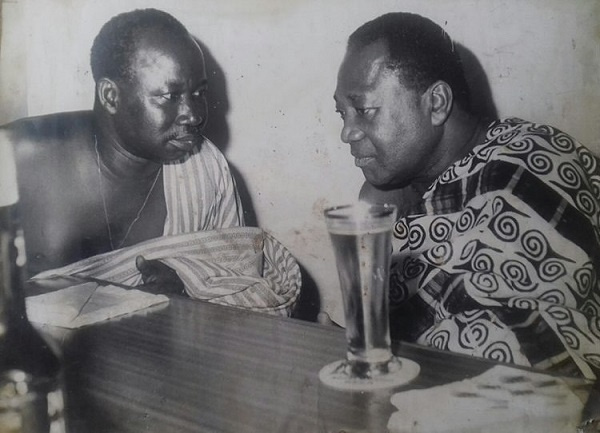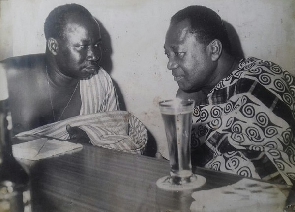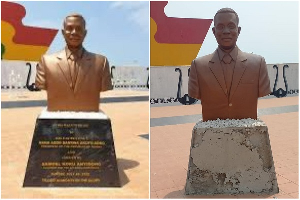In January this year, we brought you a story about one of Ghana's first indigenous businesses, Tata Brewery Limited and the brain behind it.
J.K Siaw who would have marked his 100th birthday January 30, 2023 was instrumental to Ghana’s industrialization drive post-independence.
Read the full story published by GhanaWeb Business on January 30, 2023
An image showing one of Ghana’s renowned business magnates, Joshua Kwabena Siaw, and the 15th Asantehene, Otumfuo Opoku Ware II, has emerged online.
The pair were captured having a conversation, as the photo shows. Today, January 30, 2023, would have been the 100th birthday of J.K Siaw, who established the first wholly-owned Ghanaian brewery, Tata Brewery Limited.
J.K Siaw was instrumental to Ghana’s industrialization drive post-independence. The era saw many business ventures establish their footholds in the country to provide primary services that mainly served the indigenous people.
His rise and fall story is captured in excerpts from a book by B. Agyeman-Duah titled; ‘General Acheampong: The Life and Times of Ghana's Head of State.’
The birth of Tata Brewery Limited began when J.K. Siaw decided to venture into business with a loan of 50 pounds sterling, which he used at the time to set up a cocoa brokerage firm.
In 1950, J.K. Siaw became a siding clerk who usually transported cocoa from Kwaku Praso in the Eastern Region to Accra. After learning and engaging in the trade for some time, he moved on to work with the Cocoa Purchasing Company and later became a cocoa and timber transporter.
In addition to the cocoa business, Siaw also supplied enamelware, an item that mainly was imported into the county until it was later banned by the Kwame Nkrumah administration.
According to the book, J.K. Siaw, in 1967, shifted his interest into the brewery sector which had huge prospects at the time. Prior to this, he applied for a business operating license under the NLC regime which deposed Kwame Nkrumah in February 1966.
The NLC regime had earlier requested that Siaw become a junior partner to some German investors who would run the company he decided to establish – a demand that did not sit well with him.
While still unhappy with the proposition, he persisted for a long period until his operational license was approved on July 26, 1969.
That year, he established the Tata Trading Company which first focused on trading key items. After operating for a while and making significant gains, Tata Brewery Limited was later inaugurated on January 30, 1973, to help provide more jobs and boost the local economy.
The inauguration ceremony was held on J.K. Siaw’s 50th birthday with then Head of State, Col. Ignatius Kutu Acheampong, present at the event. The former military leader, in his speech, gave his unconditional support to J.K. Siaw to run the wholly Ghanaian-owned company.
At the time when Ghana shuffled through various military regimes, the new leader, Jerry John Rawlings, upon taking office, confiscated all the assets of J.K. Siaw and his brewery establishment after it was alleged he was evading taxes.
The move impacted the brewery's technical and financial operations, leading to J.K. Siaw escaping from Ghana to London to avoid being jailed and tortured under the military regime.
In what would be a self-imposed exile, J.K. Siaw who was now based in London sent numerous petitions to the PNDC regime of J.J. Rawlings for a return to Ghana without arrest.
His pleas, however, fell on deaf ears as Tata Brewery Limited was later sold to private foreign investors and was renamed the Achimota Brewery Company (ABC) which today stands as Guinness Ghana Breweries in Accra, a fully foreign-owned entity.
The PNDC regime labelled J.K. Siaw as a fugitive although there were no charges proffered against him, nor was he invited to stand trial for the alleged crime of tax evasion.
A few years later, Joshua Kwabena Siaw became indisposed due to ill health and later died while in exile in October 1986.
Although still a son of the land, the PNDC regime, following his demise, allowed for his remains to be brought home for burial despite still refusing to return J.K. Siaw's assets to his family.


Brief profile of JK Siaw
He was born in 1923 at Obomeng in the Kwahu Mountains of the Eastern Region. He enrolled in school at the age of twelve after working on cocoa farms to support his education.
J.K. Siaw, as a young boy, learnt how to weave and sell baskets to make a living and support his education. At 19 years old, he became a teacher and later worked with the Bremang Gold Dredging Company near Bogoso in the Western Region.
His love for teaching and education saw him return to the New Juaben Grammar School which was later set up to be the Christ College in 1946 and then moved to the Ghana Secondary School in Effiduase by 1976.
MA/FNOQ
Watch the latest edition of BizTech and Biz Headlines below:
Business News of Tuesday, 15 August 2023
Source: www.ghanaweb.com

















